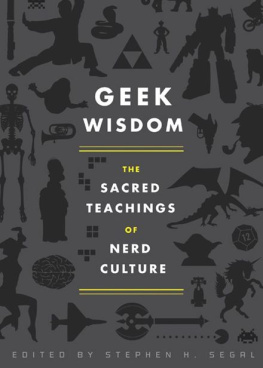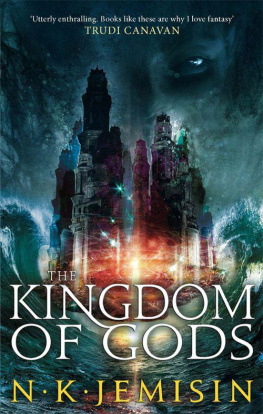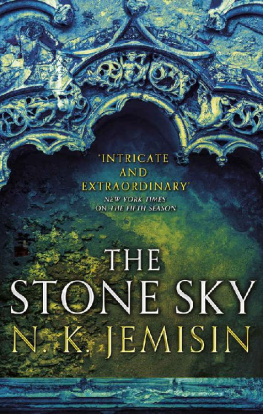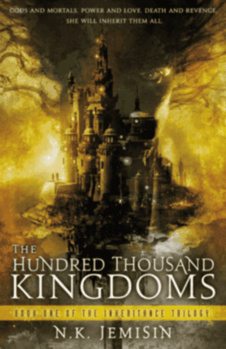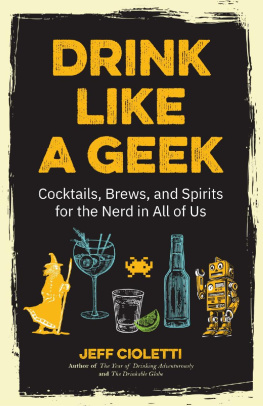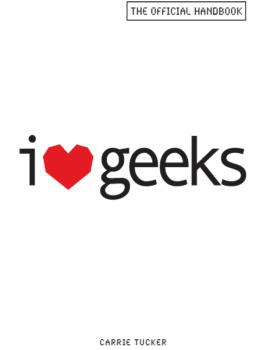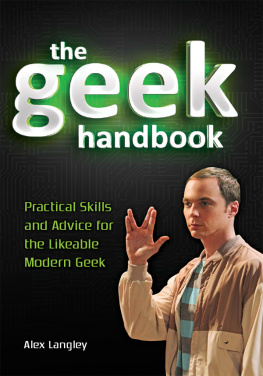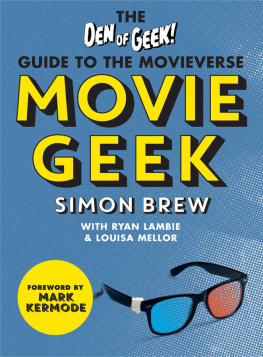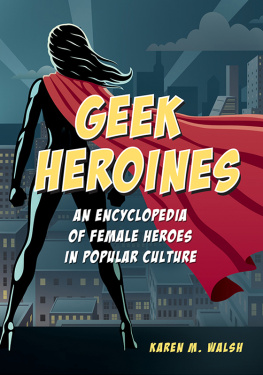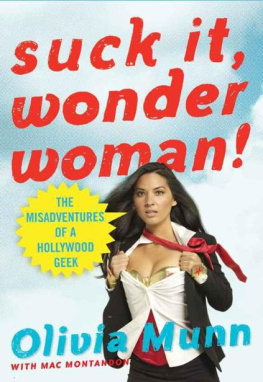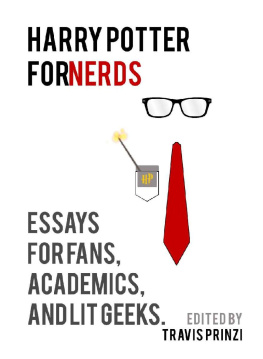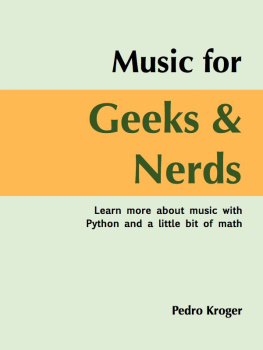Copyright 2011 by Quirk Productions, Inc.
All rights reserved. No part of this book may be reproduced in any form without written permission from the publisher.
DEDICATION
This book is dedicated to everyone whos ever said one of these things out loud during conversation.
(Especially John, Greg, Mike, Lori, Jeannie, Chris, Ben, Paul, Steve, Paul, Nina, Lisa, Jenn, Cameron, Tempest, Vanessa, Julie, and Stu. I have been, and always shall be, et cetera, et cetera.)
TABLE OF
CONTENTS
INTRODUCTION
I wish I could remember who asked me the question. Because I know for sure that my answer is what set me on the path that has brought me here, to you, on this page. The question was: What was your religion when you were growing up? And my answer was: Uh, science fiction, pretty much.
I meant it as a joke. I was poking fun at myself, saying that Id been such a freaking geek as a kid, watching Star Trek and reading Tolkien and writing computer programs and building TARDIS models, youd think that stuff was my religion. But as soon as it came out of my mouth, I immediately understood that this was no joke. It was absolutely 100 percent true in a way that Id never thought of beforeand, furthermore, it was a good thing.
What is religion? Never mind all the trappings, all the ceremonial garments and the prayer rules and the fish on Friday. What is religion really for? Its a framework of ideasa body of thought shared by a community, written and handed down through literaturethats intended to guide us toward maturity by helping us ask and answer the big, cosmic questions about existence. Who are we? Where did we come from? Is there anyone else out there in realms of being we cant see? Here on earth, why cant we get along with one another better than we do? And how can we possibly find any redemption for the mess we tend to make of things?
The Bible tells stories answering these questions. So does the Quran. So do the Upanishads. So do the sacred books of every other religion. The stories in each tradition vary a lot in the details, but they all make their way around to more or less the same points that, in turn, ultimately boil down to this: Hey, show some respect for the universe, because its a whole lot bigger than you.
You know what? Religion isnt the only place to find those kinds of stories. The modern scientific world tells them, too. In fact, geek culture is built on them.
Look at the Bible. In the beginning, God gave Adam and Eve a couple simple rules, and they didnt obey them, and we got to see how that affected the rest of their lives and what it implies for us. Then Moses brought down ten divine algorithms from the Mount for everyone to live bydont kill, dont bear false witness, do honor your parents, etc.and we got to spend the rest of the Bible tagging along as generations upon generations of slaves, peasants, merchants, and kings alternately followed and broke these commandments and tried to learn how to live with the consequences.
And now look at Isaac Asimov, scientist and novelist. He was not, obviously, God. He didnt create the universe, humanity, and everything in between. But he did imagine that someday humanity would create artificial beingsmechanical intelligencesand would have to give them rules to live by. And thus, after school, while my best friend John was in catechism class reading from the Gospel of Matthew, I could be found at home reading from Asimovs book I, Robot, watching cybernetic Abrahams and Jobs with names like SPD-1 and NS-10 do their damnedest to make it through situations where the rules of life seemed just impossible to cope with.
Does that sound strange? That robots, as envisioned as realistically as possible by a scientifically trained futurist, should suffer from existential angst? In fact, it makes tremendous sense. Because when Asimov sat down to codify his Laws of Roboticsthe practical operational rules that would make it possible for these new intelligent beings to live in harmony with one another and their creatorswhat he came up with was startlingly similar to the moral code outlined by most every religion and philosophy throughout human history. Oh, sure, it looks different
1. A robot shall not harm a human being or, through inaction, allow a human being to come to harm.
2. A robot shall obey the orders given by a human being, except where this would conflict with the First Law.
3. A robot shall protect its own existence, except where this would conflict with the First or Second Law.
but when you put that in plainer, more casual language, what it amounts to is this:
Its important to take care of yourself, but its more important to spread happiness, but its even more important to hold life sacred.
You dont have to be a robot, or even a sci-fi geek, to understand thats a pretty straightforward description of being a good person. And, you know, being a good person is hard. So if geek culture can offer fresh, new, alternative paths to all the eternal truths that religion and philosophy have managed to discover over the past few thousand yearspaths that welcome those whove been turned away from the more traditional routesthen I say, let there be geekery.
The realm of geekdom, of course, is much bigger than just science fiction. Geeks are passionate fans of stuff, and particularly of stuff that lies somewhere along one of two cultural axes: math and myth. The love of math stuff gives us science geeks, computer geeks, chess geeks; the love of myth stuff gives us theater geeks, literary geeks, ancient-Greek geeks. This is why science fiction and role-playing games make up the enduring popular image of modern-day geekdom, mind you, because those are the places where math and myth intersect: literature built on the infinite possibilities of science, improv sword and sorcery shaped by the numerical output of 20-sided dice.
Hence Geek Wisdom: the first compendium of sacred teachings from the wide-ranging holy scriptures of geekdom, that weird mass of pop culture and high art ranging from blockbuster movies to esoteric novels to cult-classic T-shirt slogans. Star Wars. The Princess Bride. Albert Einstein. Stan Lee. From such sources weve gathered (and mused thoughtfully upon) the deepest, purest, most profound ideas and sayings to be found. The ones that cut right to the heart of life in the twenty-first century. The ones we quote as if theyd come from the Bible, or from Shakespeare. The ones that, increasingly, have emerged from the underground to form the cellular structure of a true new culture canon.
Our culture canon. And thus does the geek inherit the earth.
A NOTE ON SPOILERS
GEEK WISDOM features quotes from many classic movies, books, and television shows. Some of the points we necessarily address will, technically, be spoilers to anyone who hasnt experienced these works directly. We have avoided, however, ruining any big surprises or twist endings; the spoilers found within are the kind of thing youd pick up from general cultural discussion of the stories in question. In other words: A few bits may be spoiled, but dont worrynone of them are ruined

